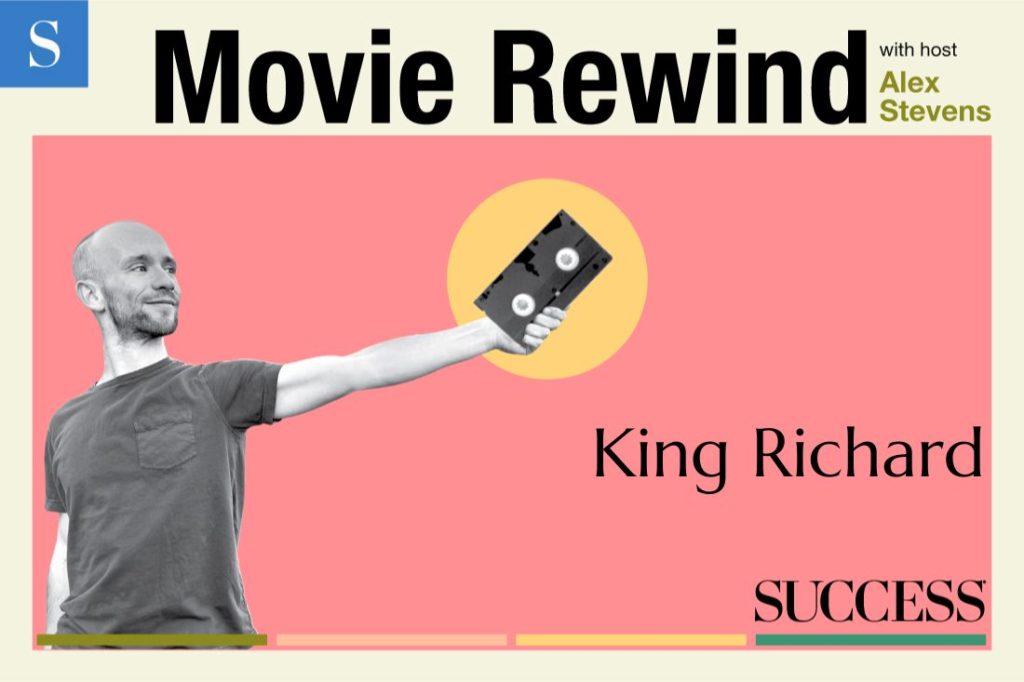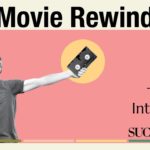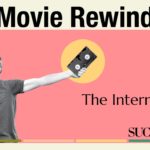Will Smith has been making headlines lately. Maybe you heard a little something about that, and maybe what you heard about it drowned out what you should have heard about King Richard, the film we’re discussing today.
Here’s what we all need to hear: This is a great movie, and it has a lot to say about personal development, following your dreams and weathering the losses. You know the drill by now, Rewinders. We’re going to dissect King Richard like no one has before.
Welcome back to SUCCESS Movie Rewind, the only podcast currently talking about Smith and skipping over “The Slap.” Let’s see what King Richard has to teach us about personal development.
Bet on yourself first.
The setting is Compton, California, in or around the early ‘90s. The eponymous Richard Williams (Smith) is there, and he has big plans. He’s going to turn his daughters, Venus and Serena Williams, into tennis stars. It’s a plan he has had since before the girls were born.
He’s a classic visionary entrepreneur—and not just in this gambit to weave his daughters into the rich tapestry of tennis history. We later find out he has had other plans like this before, and we come to know Richard as business-like and determined, perhaps even to the detriment of his family relationships.
We see Richard pitching Venus and Serena to tennis coaches. He wants the coaches to share his vision for the girls’ future, but he suffers some early failures in that arena. One coach even tells him, “It’s like asking somebody to believe that you have the next two Mozarts living in your house.”
Importantly, that same coach follows up with, “Maybe you can prove me wrong.” And, as all of us who live in the present know, he does prove that coach wrong. That’s down to a lot of factors—not least of which is the game-changing talent and dedication of Venus and Serena—but one of the biggest factors is that he doesn’t give up.
He lives out our first SUCCESS Movie Memento™ for this week: Bet on yourself first. In this case, Richard bets on his daughters first, but it’s also a bet on his ability to see and foster tennis greatness in them.
Here’s the thing that early entrepreneurs and those with big personal goals need to understand: No one else is betting on you. If you’re frustrated that others don’t share your vision, that’s not a sign that you should give up. You shouldn’t even be frustrated with them. How could they share your vision? It’s your vision. You have to bet on your ability to make it a reality.
It’s an exercise in self-love. It’s an exercise in self-examination. And it’s an exercise in faith. But until you take that leap, it’s hard to start walking down the path you’re meant to walk on.
Be open to the open stance.
Richard eventually does find coaches for his daughters, and we later see him arguing with one coach about some of the training advice he’s giving. Specifically, he and the coach are going back and forth in this great bit of dialogue about whether the “open stance” is the right move.
Richard has opinions about this stuff. He was an athlete himself, and he’s the one with the vision. But he’s not going to achieve this vision on his own. He needs to do what our second SUCCESS Movie Memento™ is telling us to do: Be open to the open stance.
In other words, leave room for other people’s perspectives. You know a lot, but you don’t know everything. Other people may also know a lot and have a lot to offer, and you can’t accept that offering as you try to achieve your vision if you’re constantly in a closed stance.
This is not to suggest, of course, that you should never have a strong opinion or you should always do what others say to do. But Richard, in the case of the film, is pushing his daughters forward to career- and life-defining moments. At the very least, he’ll need to take in their input, and the input of a famous tennis coach is probably good to take under advisement, too. We’ll all encounter equivalents on our own journeys, and we’ll need to be open to them.
Love shows up for the losses.
For our next personal development takeaway, I want you to step into the headspace of the protector, defender, advocate or parent, if you aren’t already there. As a father myself, I took parts of this movie hard. It’s a moving portrayal of certain aspects of parenthood, and there’s something here for all of us to understand and appreciate.
We hear Richard telling his daughters about his childhood—a particular incident in which he accidentally touched a white man’s hand while exchanging money his father had asked him to exchange and suddenly being the victim of a violent racist group beating. In the chaos, he saw his own father run away and leave him to be beaten more.
Richard says he never wanted his daughters to see their father running away like that. It gets me every time—I suspect it gets any parent—and it leads me to our third Memento™: Love shows up for the losses.
We don’t all face extremes like that (and none of us should have to), but one thing is true for everyone: The world has beatings of one kind or another in store for all of us. And love shows up for those beatings. It doesn’t promise to prevent them, but it promises to help you pick up the pieces and move on.
When you’re looking back at your life so far or forward to what you’re likely to face as you pursue your goals, you will probably ask yourself at some point: Will I be enough? The answer is no—you, alone, won’t be enough. You need your people. And they won’t be able to prevent every problem or setback, but they will show up for the losses.That’s where I’ll leave it for King Richard. It’s a great movie with much more to say than what we’ve covered here. If you haven’t seen it, I recommend it—and try to watch it without slap-themed pop culture influences drowning out the message. See you next week, Rewinders.











